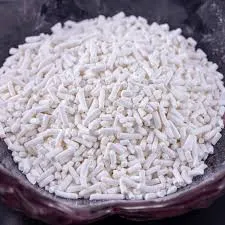
Phosphoric Acid 7664-38-2 Properties, Uses, and Safety Information Overview
Understanding Phosphoric Acid A Comprehensive Overview
Phosphoric acid, with the chemical formula H₃PO₄, is a mineral acid that plays a significant role in various industrial and agricultural applications. Commonly known for its food-grade variant, phosphoric acid is also a crucial component in the production of fertilizers, detergents, and even in the food and beverage industry. This article delves into the properties, production, uses, and safety considerations associated with phosphoric acid.
Properties of Phosphoric Acid
Phosphoric acid is a colorless, odorless, and non-volatile liquid that typically appears in a syrupy form. It is a triprotic acid, meaning it can donate three protons (hydrogen ions) in solution, which gives it unique properties that are essential for its wide-ranging applications. The pH of a concentrated solution of phosphoric acid is usually around 1-2, indicating a strong acidic nature, albeit it is weaker than hydrochloric acid and sulfuric acid.
The molecular weight of phosphoric acid is approximately 98 grams per mole, and it has a melting point of 42.35 °C. When mixed with water, it produces an exothermic reaction, and it is highly soluble in water, making it easy to incorporate into various formulations.
Production of Phosphoric Acid
Phosphoric acid is produced primarily through the reaction of phosphate rock with sulfuric acid. This process yields phosphoric acid and calcium sulfate (gypsum) as a by-product. The manufacturing process can also adhere to other methods such as the thermal process, which involves the oxidation of phosphorus.
Phosphate rock, which contains a high concentration of phosphorus, is mined and then treated with sulfuric acid under controlled conditions to generate phosphoric acid. The resulting phosphoric acid can be further purified, depending on its intended application, leading to food-grade or technical-grade products.
Applications of Phosphoric Acid
phosphoric acid 7664 38 2

One of the most well-known applications of phosphoric acid is in the food and beverage industry. It is commonly used as an acidity regulator, flavoring agent, and preservative. For instance, phosphoric acid is a key ingredient in soft drinks, where it contributes to the sharp flavor while aiding in product preservation.
In agriculture, phosphoric acid is a vital component of fertilizers. It is used to produce phosphate fertilizers, which are crucial for plant growth, providing essential nutrients that improve crop yield and quality. Phosphoric acid also plays a role in the production of animal feed, ensuring livestock receives necessary nutrients for healthy development.
Moreover, phosphoric acid is utilized in various industrial processes. It acts as a rust remover in metal treatment, is used in the manufacture of glass, ceramics, and enamel, and serves in the production of detergents and cleaning products. Additionally, it is employed in the electronics industry for cleaning and etching metals and semiconductors.
Safety Considerations
While phosphoric acid is widely used, it is essential to handle it with care. As a corrosive substance, it can cause burns and irritation upon contact with skin or eyes. Therefore, personal protective equipment such as gloves, goggles, and protective clothing should be worn when working with this chemical.
Inhalation of phosphoric acid mist or vapor can cause respiratory issues, and ingestion can lead to severe health problems. Adequate ventilation is crucial while handling phosphoric acid to minimize exposure. Proper storage and disposal procedures should also be followed to prevent environmental contamination.
Conclusion
Phosphoric acid is an indispensable chemical with diverse applications across multiple industries. Its unique properties and ability to enhance various products make it a valuable compound in both food production and industrial processes. However, while leveraging its benefits, it is vital to prioritize safety and environmental considerations to mitigate potential risks associated with its use. As industries continue to innovate and evolve, phosphoric acid will likely maintain its significant role in shaping various sectors of our economy.
-
Buy High-Quality Trichloroisocyanuric Acid for Sale | TCCA 90% SupplierNewsAug.30,2025
-
Pure Sodium Dichloroisocyanurate Dihydrate | Powerful DisinfectantNewsAug.29,2025
-
Industrial Chemicals: Quality & Purity for Every IndustryNewsAug.28,2025
-
Nitrile Rubber Honoring Strict Production StandardsNewsAug.22,2025
-
Aspartame Ingredients Honoring Food Safety ValuesNewsAug.22,2025
-
Fertilizer for Balanced Plant NutritionNewsAug.22,2025
-
Cyanide Gold Processing with High Purity AdditivesNewsAug.22,2025
Hebei Tenger Chemical Technology Co., Ltd. focuses on the chemical industry and is committed to the export service of chemical raw materials.
-

view more DiethanolisopropanolamineIn the ever-growing field of chemical solutions, diethanolisopropanolamine (DEIPA) stands out as a versatile and important compound. Due to its unique chemical structure and properties, DEIPA is of interest to various industries including construction, personal care, and agriculture. -

view more TriisopropanolamineTriisopropanolamine (TIPA) alkanol amine substance, is a kind of alcohol amine compound with amino and alcohol hydroxyl, and because of its molecules contains both amino and hydroxyl. -

view more Tetramethyl Thiuram DisulfideTetramethyl thiuram disulfide, also known as TMTD, is a white to light-yellow powder with a distinct sulfur-like odor. It is soluble in organic solvents such as benzene, acetone, and ethyl acetate, making it highly versatile for use in different formulations. TMTD is known for its excellent vulcanization acceleration properties, which makes it a key ingredient in the production of rubber products. Additionally, it acts as an effective fungicide and bactericide, making it valuable in agricultural applications. Its high purity and stability ensure consistent performance, making it a preferred choice for manufacturers across various industries.





